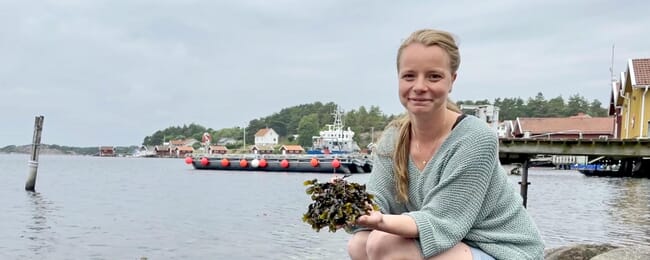
She will investigate how ocean acidification is likely to impact a range of species of macroalgae © Susanne Liljenström
As part of the project, Alexandra Kinnby, a researcher at the University of Gothenburg’s department of marine sciences, has been awarded a SEK 5.4 million (£400,000) research grant from Formas.
According to Susanne Liljenström, Kinnby defended her dissertation in the spring of 2021 on a thesis that dealt with how climate change affects the world's seaweed belts. One of her conclusions was that bladder wrack grows faster but becomes more fragile in acidified seawater and is therefor more vulnerable to waves and winds.
In her new project, Kinnby will study whether this phenomenon also occurs in other macroalgae, but also look at how different life stages are affected by ocean acidification and other climate changes.
"It feels fantastic to get a chance to implement a project based on findings from my doctoral thesis. It's a project I've been thinking about for a long time," Kinnby told Liljenström.
Planning for experiments in Sweden and Canada
In practical terms, Kinnby will collect different species of macroalgae and expose them to future ocean acidification conditions. Factors she will investigate include how growth, strength and tissue structure are affected.
She will do the research together with international colleagues, with practical experiments in both Sweden and Canada.
"I will collaborate with Christopher Harley and Patrick Martone at the University of British Columbia in Vancouver, Canada. I will also be working with Catriona Hurd at the University of Tasmania,” she explained.
"It will be great fun to have the opportunity to collaborate with people who are both outstanding researchers but also role models from whom I can learn a lot,” she added.
Kinnby hopes the project will increase the understanding of how a changing climate can affect species that play a very important role in coastal ecosystems.
"Macroalgae are habitat-forming species and in this way they play an important role in our ecosystems. In addition, algae are becoming increasingly common to cultivate in aquaculture, and then it is important to know how these species will be affected when our climate changes. The results may also have implications for restoration and management," she concluded.


